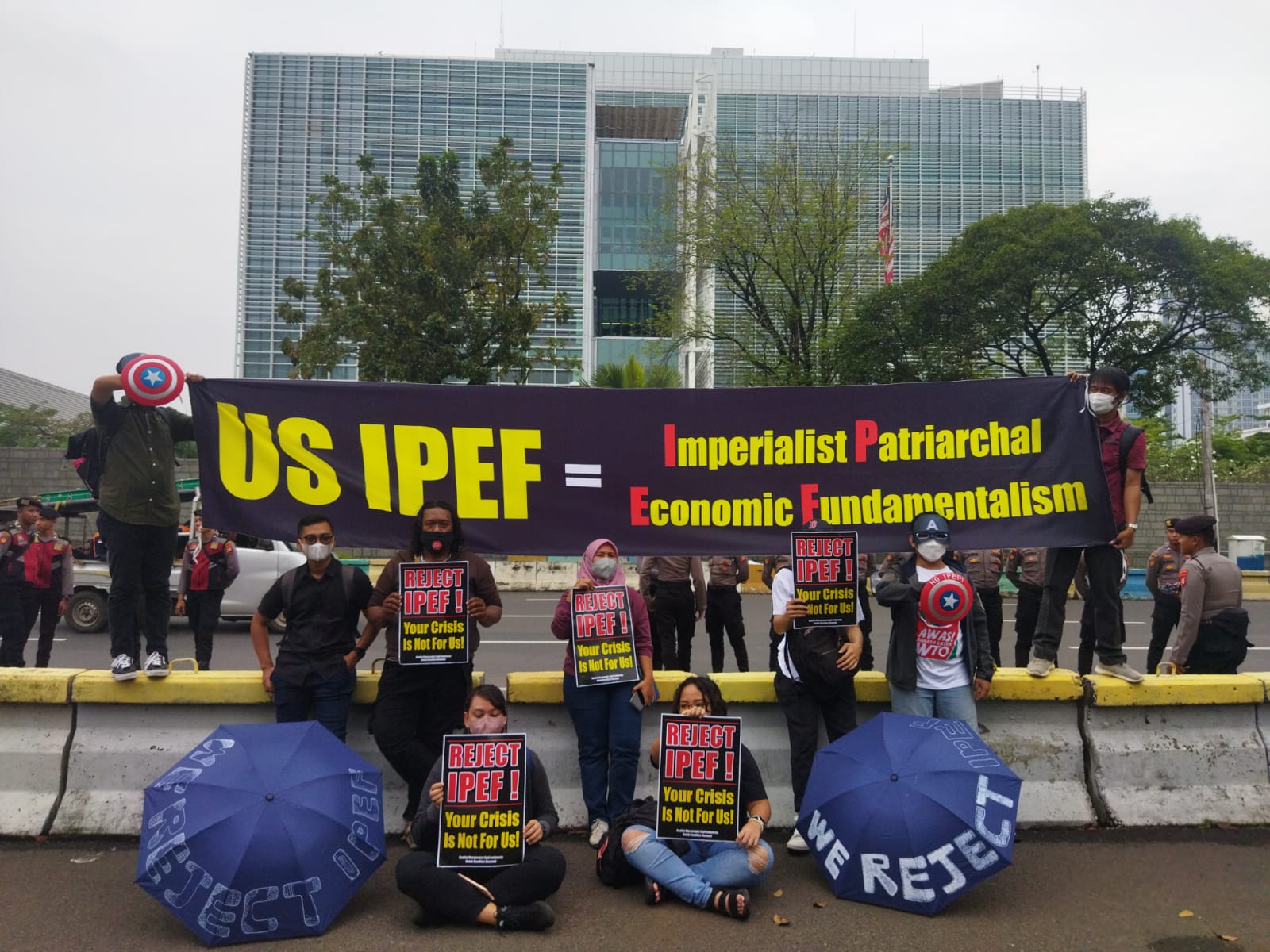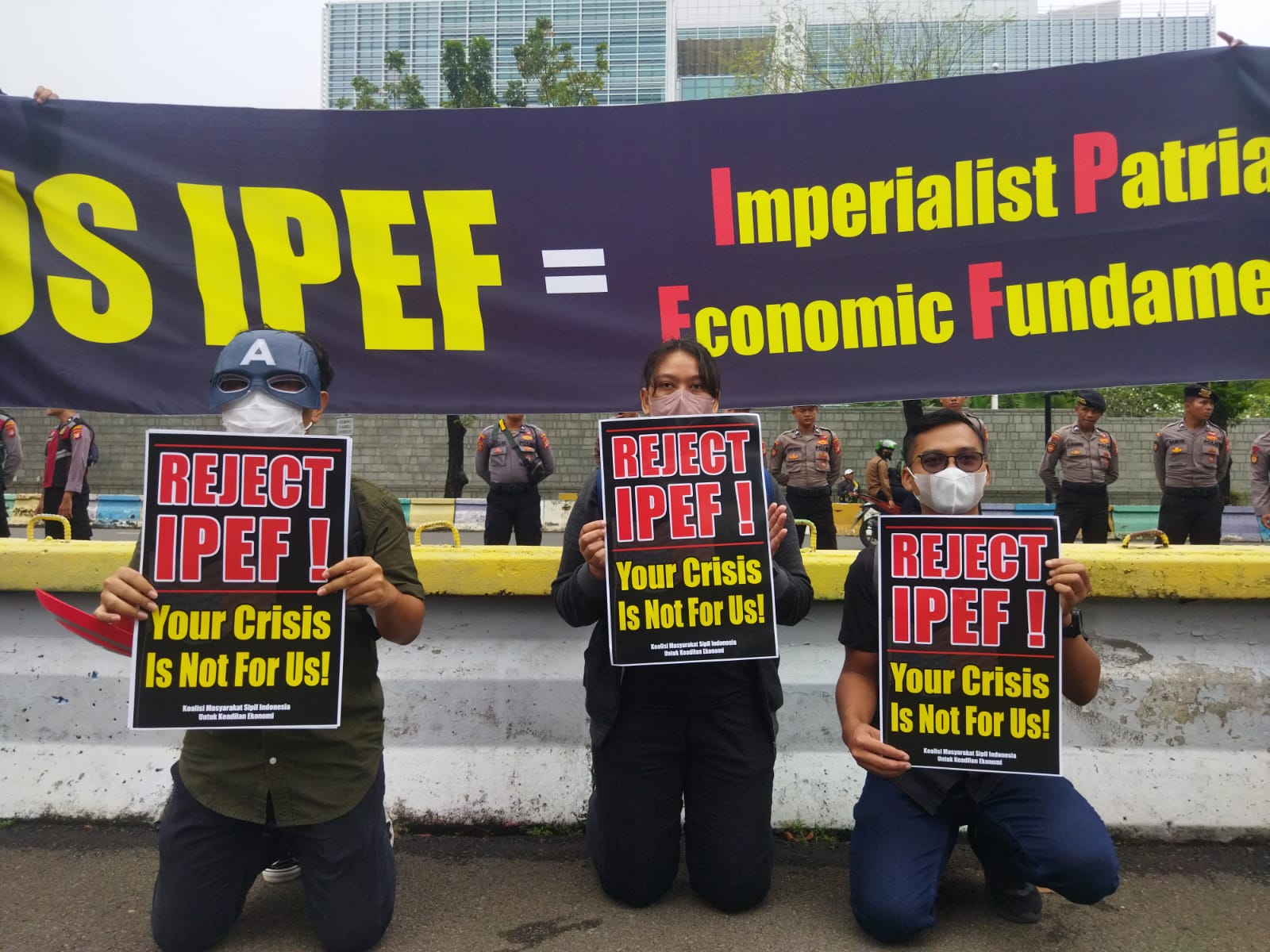Press Release
Responding to IPEF Negotiation Round
15 March 2023


Jakarta, 15 March 2023. Indonesian Civil Society Coalition for Economic Justice held a protest today in front of the US Embassy in Jakarta to express its rejection of the Indo-Pacific Economic Framework (IPEF). In the midst of the global economic crisis, the United States is trying to rebuild its national industrialisation with a less open free trade agreement and push for policy harmonisation based on US standards. The IPEF will hold its second round of negotiations in Bali from 13-19 March 2023.
IPEF was initiated by the United States in September 2022 as a new model of regional free trade agreement involving 13 other partner countries. The IPEF includes four pillars: (1) trade; (2) supply chain; (3) clean energy, decarbonisation, and infrastructure; and (4) taxation and anti-corruption. The US government is targeting the completion of the negotiations this year to coincide with the APEC Summit to be held in San Francisco in November 2023.
Director of Indonesia for Global Justice, Rahmat Maulana Sidik emphasised that the IPEF negotiation process was led by the US, including the drafting of the agreement text, in a closed manner. “With the short period of time and the closed draft text of the agreement to the public, it is certain that there is no meaningful participation by partner countries to provide their input in this agreement process. Moreover, to analyse the social, environmental, and gender impacts that will potentially arise,” he said. US domination of the IPEF process was also exercised through deciding the location for the negotiation rounds and the involvement of US-based multinational companies in the hearing process.
Kartini Samon of GRAIN stated that the Biden administration manoeuvred to avoid debate and resistance from the US Congress by not including market access provisions or tariff reductions and avoiding changes to domestic laws. Following the launch of the IPEF, the US Government released a report containing a priority list for the reduction of non-tariff barriers that will be promoted through the IPEF through the harmonisation of a number of policies and regulations that are seen as technical barriers to trade with the United States. “For Indonesia itself, this policy harmonisation effort through IPEF can cause problems and widespread impacts. In the agricultural sector, for example, efforts to harmonise technical barriers to trade could oblige Indonesia to relax domestic regulations related to the commercialisation and import of genetically modified seeds and food products. This, of course, would greatly benefit the US, which hosts a number of giant producers of genetically modified products. Besides the provisions related to genetically modified products, another rule that is seen as a technical barrier that will be pushed for harmonisation is the mandatory halal certification for imports of livestock products, considering that only 3 out of 14 IPEF member countries have this obligation; Brunei, Malaysia and Indonesia. Harmonisation of halal certification could directly affect livestock farmers and abattoirs as well as consumers in Indonesia,” said Kartini Samon.
Meanwhile, Arie Kurniawaty representing Solidaritas Perempuan stated that IPEF will be the first mega-regional economic agreement for the US, involving 40% of the world’s GDP will produce new rules, processes and commitments that to secure US trade and investment interests to offset China’s dominance, political and military influence in the Asia-Pacific region. “The IPEF is not, and will never be, just about economic trade. Rather, it is a chain of hegemonic power domination for the US, it is like a continuation of the cold war that always harms the sovereignty of nations and the human rights of Asian women and people as developing countries.” she said.
IPEF uses language that seems to be in favour and good for the interests of sustainable development, such as clean energy being one of the pillars. In fact, this provision is only used by the US to strengthen US domestic industrial development related to the production of green technology for energy transition. Rachmi Hertanti from Transnational Institute stated “The US wants to keep pace with China to become a major player in the production of green technology for energy transition. It is highly unlikely that IPEF will bring US investment into Indonesia to support Indonesia’s industrial downstream agenda. And this precludes Indonesia from benefiting from this co-operation. As a result, the IPEF will only contradict Indonesia’s national interests.
Marthin Hadiwinata from Ekomarin closed with the statement that the fisheries sector in the trade pillar discussed in the IPEF will regulate the prohibition of subsidies in the sector. The rationale for this is that subsidies are considered to encourage uncontrolled exploitation of fisheries resources. Therefore, Indonesia’s domestic regulations that still provide subsidies will be intervened. “The majority of fisherfolks in Indonesia are small and medium scale. Removal of subsidies in the fisheries sector will clearly hamper Indonesian fisherfolks. This will be an obstacle for developing countries like Indonesia to maintain domestic rules, which has also been done in the WTO reform negotiations,” he said.
Contacts for further information:
Arie Kurniawaty – Solidaritas Perempuan,
+62 812 8056 4651
Rahmat Maulana Sidik – Indonesia for Global Justice
+62 812 0025 135









Discussion about this post